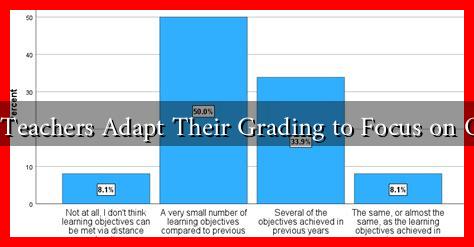-
Table of Contents
How Can Teachers Adapt Their Grading to Focus on Objectives?
In the ever-evolving landscape of education, the traditional grading system often falls short in accurately reflecting student learning and mastery of objectives. As educators strive to create more effective learning environments, adapting grading practices to focus on specific learning objectives has become increasingly important. This article explores various strategies teachers can employ to align their grading with educational goals, ensuring that assessments are meaningful and reflective of student understanding.
The Importance of Objective-Based Grading
Objective-based grading shifts the focus from merely assigning letter grades to evaluating students based on their mastery of specific skills and knowledge. This approach not only provides a clearer picture of student performance but also encourages a growth mindset. According to a study published in the Journal of Educational Psychology, students who receive feedback based on learning objectives are more likely to engage with the material and improve their performance over time.
Strategies for Adapting Grading Practices
Teachers can implement several strategies to adapt their grading systems to focus on objectives:
- Define Clear Learning Objectives: Establish specific, measurable, achievable, relevant, and time-bound (SMART) objectives for each lesson or unit. This clarity helps students understand what is expected of them.
- Use Rubrics: Develop detailed rubrics that outline the criteria for success based on the learning objectives. Rubrics provide transparency and help students self-assess their work.
- Incorporate Formative Assessments: Utilize formative assessments, such as quizzes, discussions, and peer reviews, to gauge student understanding throughout the learning process. This ongoing feedback allows for adjustments before summative assessments.
- Implement Standards-Based Grading: Shift to a standards-based grading system where students are assessed on their ability to meet specific learning standards rather than on a curve or relative performance.
- Encourage Self-Assessment: Teach students to evaluate their own work against the learning objectives. This practice fosters self-reflection and ownership of their learning journey.
Case Studies and Examples
Several schools and educators have successfully implemented objective-based grading systems, yielding positive results:
- Case Study: A High School in California – This school adopted a standards-based grading system, resulting in a 20% increase in student engagement and a 15% rise in overall academic performance within one academic year.
- Example: A Middle School Math Teacher – By using rubrics aligned with learning objectives, this teacher reported that students were more focused on mastering concepts rather than merely completing assignments for points.
Challenges and Considerations
While adapting grading practices to focus on objectives offers numerous benefits, it is not without challenges. Educators may face resistance from students and parents accustomed to traditional grading systems. Additionally, implementing new grading practices requires professional development and collaboration among staff. To address these challenges, schools can:
- Provide training sessions for teachers on effective grading practices.
- Engage parents in discussions about the benefits of objective-based grading.
- Foster a culture of continuous improvement where feedback is valued and used to enhance teaching and learning.
Conclusion
Adapting grading practices to focus on learning objectives is a transformative approach that can significantly enhance student learning and engagement. By defining clear objectives, utilizing rubrics, incorporating formative assessments, and encouraging self-assessment, teachers can create a more meaningful assessment environment. While challenges may arise, the benefits of objective-based grading—such as improved student performance and a deeper understanding of material—make it a worthwhile endeavor. As education continues to evolve, embracing these innovative grading practices will be essential in preparing students for success in an increasingly complex world.

